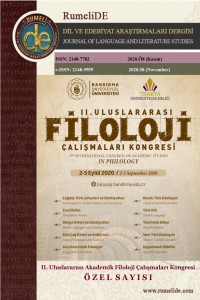Abstract
Beşeri bilimler üzerine yapılan son araştırmalar, insan nüfusu şu anda olduğu gibi, herhangi bir kısıtlama ve çevre bilinci gözetilmeksizin artmaya devam ederse, insanlığın bir çevre felaketinin eşiğinde olduğu fikrini ortaya koymaktadır. Amerikalı bilim kurgu yazarı Sheri Stewart Tepper, The Margarets (2007) romanını ekofeminist bir bakış açısıyla yazmıştır. Romanın distopik gelecek dünyasında, kadın başkahraman Margaret Bain, insanlığı yok olma tehlikesinden kurtarma görevini üstlenmektedir. Bunun için, insanların çalınan kolektif hafızasını geri almanın bir yolunu bulması gerekmektedir. Çünkü hafıza, insanları birleştirmenin ve nihayetinde onları mükemmel insanlar haline getirmenin temel unsurudur. İnsanlar genetik olarak geçmiş hatalarından ders çıkarma yetisine sahiptir. Önceki hatalarından ders çıkartarak kolektif bir hafıza oluştururlar ve bu bilgi ile varlıklarını sürdürürler. Romanda, insan nüfusu dünya üzerinde yaşamaya devam edemeyeceğinden, insanların kendilerine yaşayacakları başka gezegenler bulmaları gerekmektedir. Gezegeninin tek ve son çocuğu olan Margaret, her biri farklı yollar izleyen ve farklı gezegenlerde kendi hayatlarını yaşayan altı alternatif benlik yaratır. Yedi Margaret deneyimlerini ve bilgilerini paylaşarak bir araya geldiğinde, birbirlerine karşı empati kurarlar ve bu şekilde mükemmel hale gelirler. Empati ile birlikte hafıza, parçalanmış benlikleri mükemmel bir bütün halinde birleştirir. Ancak insanlar geçmişlerini/tarihlerini hatırladıklarında, gelecekte kendilerini neyin beklediğinin daha fazla farkına varırlar. İnsanlar, kapsamlı bir bakış açısıyla ve geçmiş eylemlerinin sonuçlarını hatırlayarak, doğal bir gereklilikle dünyanın iyileşmesine yardımcı olabilirler. Ancak bu şekilde insanlık ve diğer tüm canlı türleri uyum içinde yaşamaya devam edebilecektir. Bu çalışmada roman, insanlığın kaderini oluşturabilecek kolektif hafızaya yönelik post-hümanist yaklaşımlar göz önünde bulundurularak eko-eleştirel bir bakış açısıyla incelenmektedir.
Keywords
References
- Aarssen, Lonnie W. (2013). Will Empathy Save Us?. In Biological Theory. 7: p. 211-216. Springer Netherlands. Retrieved December 21, 2018, from https://doi.org/10.1007/s13752-012-0062-2.
- Baccolini, Raffaella and Moylan, Tom (2003). Dystopia and Histories. In Dark Horizons: Science Fiction and the Dystopian Imagination. Routledge.
- Blustein, Jeffrey. (2008). The Moral Demands of Memory. New York: Cambridge University Press.
- Braidotti, Rosi. (2013). The Posthuman. Cambridge, UK: Polity Press. ....................
- Clarke, Nic and Sherryl Vint. (2008). Two Views: The Margarets by Sheri S. Tepper. Strange Horizons. Issue:21 July 2008. http://strangehorizons.com/non-fiction/reviews/two-views-the-margarets-by-sheri-s-tepper/.
- Ehrlich Paul R. Michael Charles Tobias, John Harte. (2014). Hope on Earth: A Conversation. University of Chicago Press.
- Tepper, Sheri S. (2007). The Margarets. New York, NY: HarperCollins Publishers.
Abstract
Recent studies on humanities put forward the idea that if the human population continues to grow, as it does now, without any restraint and environmental awareness, the whole world will be on the verge of an environmental catastrophe. Sheri Stewart Tepper, a science-fiction American writer, wrote her novel The Margarets (2007) from an ecofeminist point of view. In the dystopian future world of the novel, Margaret Bain, the female protagonist, undertakes the mission to save humankind from the danger of extinction. In order to this, she has to find a way to get back the stolen collective memory of humans since memory is the fundamental element in uniting humans, and ultimately making them perfect humans. Humans genetically are capable of learning from their past mistakes. They build a collective memory by learning from their previous mistakes and with this knowledge they continue their existence. Since the human population cannot continue living on Earth, people have to find other planets to live on. Margaret, the only child of her planet, creates six alternate selves, each taking different paths and living their own lives on different planets. When all of the Margarets come together sharing their experience and knowledge, they feel empathy towards the others and by this way they become perfect. Memory together with empathy unites the fragmented selves into a perfect whole. Only when people remember their past/history, then they are more aware of what is waiting for them in the future. By taking a comprehensive point of view and remembering the consequences of past actions, humans can help the healing of the Earth as a natural necessity. Only by this way, humankind and all other species will continue surviving in harmony. The purpose of this study is to analyse the novel from an ecocritical point of view, in terms of posthumanist approaches towards collective memory which may form the destiny of humanity.
References
- Aarssen, Lonnie W. (2013). Will Empathy Save Us?. In Biological Theory. 7: p. 211-216. Springer Netherlands. Retrieved December 21, 2018, from https://doi.org/10.1007/s13752-012-0062-2.
- Baccolini, Raffaella and Moylan, Tom (2003). Dystopia and Histories. In Dark Horizons: Science Fiction and the Dystopian Imagination. Routledge.
- Blustein, Jeffrey. (2008). The Moral Demands of Memory. New York: Cambridge University Press.
- Braidotti, Rosi. (2013). The Posthuman. Cambridge, UK: Polity Press. ....................
- Clarke, Nic and Sherryl Vint. (2008). Two Views: The Margarets by Sheri S. Tepper. Strange Horizons. Issue:21 July 2008. http://strangehorizons.com/non-fiction/reviews/two-views-the-margarets-by-sheri-s-tepper/.
- Ehrlich Paul R. Michael Charles Tobias, John Harte. (2014). Hope on Earth: A Conversation. University of Chicago Press.
- Tepper, Sheri S. (2007). The Margarets. New York, NY: HarperCollins Publishers.
Details
| Primary Language | English |
|---|---|
| Subjects | Linguistics |
| Journal Section | World languages, cultures and litertures |
| Authors | |
| Publication Date | November 21, 2020 |
| Published in Issue | Year 2020 Issue: Ö8 |

